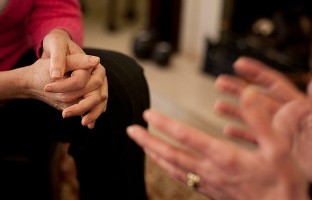Faking it
It is always interesting to me how the same set of books can evoke different questions for different groups of students. Each fall my colleague Dudley Rose and I read our way through a range of accounts of ministry with our new M.Div. students. Inevitably one issue emerges that is close to the heart of the group. Some years it is the theme of calling. In others, it's the relationship between academic study and the practices of faith. Some years, we focus on spiritual formation; in other years, we explore how to organize communities for change.
This year, the theme that has emerged in Intro to Ministry Studies is, in the words of one of our students, "faking it." We began the term with Simone Weil, who wrote of "experimental certainties" and encouraged us to act as if we believed things before we actually believed them. If we don't act as if the attention cultivated in study increases our ability to be present to God and our suffering neighbor, she argued, we will likely never have the experience of it.
Read our latest issue or browse back issues.
We moved next to Gregory the Great's Pastoral Care, written to his friend, John of Ravenna, who had criticized Gregory for wanting to escape the burden of the office of pope to which he had recently been elected. I am writing this book, Gregory told John, to explain exactly how onerous this burden is to me. As onerous as it was, Gregory accepted it, dedicating himself to be the servant of the servants of God.
Then we read Jonathan Rosen's novel Joy Comes in the Morning. In one scene, Rabbi Deborah Green offers pastoral reassurance to a woman who has nearly died, even though she herself is full of doubt. "Faker!" an inner voice shouts at her as she prays with the woman. But pray she does.
For students struggling to discern their calling, these accounts of the often fragile connections between inner convictions and pastoral practice flash like emergency signals. Can I be a minister, they wonder, if my beliefs are not settled? If I act as if I believe things I'm not sure I believe (Weil) or take on work in ministry that I don't feel capable of doing (Gregory) or rely on the psalms to speak comfort that I cannot myself feel (Green), am I being inauthentic? Do I have to know I'm called before I can do this work?
Next on our list is Gandhi's autobiography, which he subtitled The Story of My Experiments with Truth for good reason: it is full of stories of his attempts to stretch himself into new ways of living and thinking by experimenting with everything from the way he ate to the friendships he cultivated, from his sexual choices to the ways in which he responded to the bigotry he encountered in the streets of South Africa. What will happen, he asks, if I attend a Christian church every Sunday? What will I find out if do my own laundry? Can I learn not to be governed by my sexual appetites? Can I keep the promise I made to my mother never to eat meat while I am living abroad? No decision was too small, no encounter was too insignificant to be excluded from Gandhi's lifelong experiment with truth.
It is through such experimentation that Gandhi discovered the dimensions of his calling, the shape and content of his convictions, and the practices of nonviolence that inspired movements of resistance that changed the world. There never came a time when he had fully arrived at the truth he sought; he experimented with his life until the end. Did he "fake it" sometimes in order to find out what would happen if he behaved in a particular way? No doubt. What made his ministry authentic was not that his beliefs were settled or that he was always sure of the rightness of his actions. What made it authentic was his willingness to seek the truth in every encounter, to experiment with the stuff of his own life in order to develop new ways of living.
In these days when our common life seems broken, we need new ways of living together, new ways of seeking justice together and new ways of resisting violence. There are many things I hope students will take from Intro to Ministry Studies: a desire to cultivate their capacity for attention; a sense of how much is at stake in whether ministry is done well or badly; an ability to draw upon the pastoral power of their religious tradition no matter how they are feeling in any particular moment. But most of all, I hope they will leave the class knowing that there is no shame in faking it if that means they're stretching themselves toward new ways of thinking, living and believing. As Gandhi teaches us, one person's experiments with truth can open new paths toward truthful living for the world.







